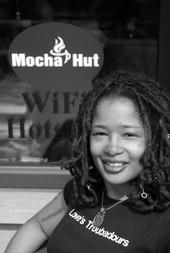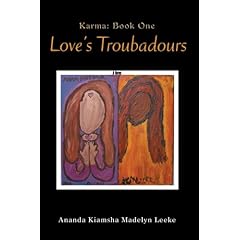 Her self published debut novel, Love's Troubadoures-Karma: Book One has been described as "extraordinary", "soulful", "inspirational" and "one of the best written books of the year" by it's readers. In it, the author, Ananda Kiamsha Madelyn Leeke takes us on a spiritual and personal journey with heroine Karma Francois, a self proclaimed BOHO B.A.P., as she recouperates her life and learns to know and love herself in the process. I recently chatted with this phenomenal artist, yoga instructor and novelist about the book, of course, spirits that can talk, and a few things that her readers can learn from Karma Francios.
Her self published debut novel, Love's Troubadoures-Karma: Book One has been described as "extraordinary", "soulful", "inspirational" and "one of the best written books of the year" by it's readers. In it, the author, Ananda Kiamsha Madelyn Leeke takes us on a spiritual and personal journey with heroine Karma Francois, a self proclaimed BOHO B.A.P., as she recouperates her life and learns to know and love herself in the process. I recently chatted with this phenomenal artist, yoga instructor and novelist about the book, of course, spirits that can talk, and a few things that her readers can learn from Karma Francios.So, what was the inspiration for "Love's Troubadours"?
It was a long process. It took 10 years. The characters came to me at the Essence Music Festival in 1997. I was shaking my groove thang and the characters came to me. So instead of going to the workshops I was going to the book stores to get poetry books and to the voo doo sites and places the main characters would go. Karma's family is from New Orleans.
So the characters came to you? What was that like?
My spirituality is open to seeing and feeling my ancestors. I've always had a connection. Sometimes I'll see their face and I'll know that they're here with me. I don't have family in Louisiana but these characters came to me. First they came out in the poetry and I was like whose that?! I didnt' know how the novel was going to end. People would ask and I'd be like, "They didn't tell me yet". And it was over, I was like "Damn!" So that's how it ended.
Wow! Why do you think you felt a connection to Nawlins'.... ? It is a special city.
When my mom was pregnant with me she was close to a family from Lousisana and they'd always say we're going to put a hex on someone in the church. I stood up at Thanksgiving and I said, "It was you!" I kept trying to say why am I so connected to voo doo? And she said "Yeah, they were always talking about that and I was around them." I've always felt connected to New Orleans.
So you said that when the characters came to you, you responded with poetry. How did this morph into prose?
All I wrote was poetry and journal writing so there were these voices and I turned them into poetry. And I didn't want to write anything longer because I was lazy but these poems started to get into epic poems. They weren't meshing together because they were skipping around different periods of times---A few years later one of m y co workers suggested that I write a novel and I said, "No!" I thought it was too much. She was a published writer. She writes childrens books and I was sharing with her, how should I go about doing this. She told me, "this is not a poem any more. It's a story."
A year later I sent my friend a segment of my work. I asked him to read because I wanted to know if this was what a man would say. And then he called and said this is a novel this is so good. I said, I can't write this by myself."
So we started that journey in May of 2001 and in 2003 we finished it. He died and that shook me to my core. I didn't want to keep writing but I had a couple of agents who were very interested in my processs. They encouraged me and told me what I needed to do and it would take another two years.--- It's not somethign that I volunteered to do because I was resisting. I chose it, it didn't choose me.
So what do you think sets "Love's Troubadours" apart from other books in the genre?
It's very different than most books who are there now about African American women. I wrote a book that I wanted to read. The way it's different, and there's some great books that are out there, is that [in the novel] there are a wide variety of people of African descent and their lives and their sexual orientations and their spiritualities and you don't see that in most books.
The cover is different. It's not a woman that is barely clothed or holding a martini or coming out of bed, and not that there arent any erotic scenes, but it makes you think and realize that there are different types of women. The other thing is that I dont 'think they're are a lot of books that celebrate what it's like to be in our communities with Black poeple who are educated, who've gone to HBCU's or ivy-leagues. You don't see museum curators. I popped alot in---I wanted to make people aware of what our life is like. The messsage is that we are different.
I read the synopsis and I'm definitely intrigued. Can you tell us a little bit more about what your novel is about?
"Love's Troubadours" is about a 30 somehting african-american women named Karma Francois. She hails from Oakland California and she is a BOHO BAP (Bohemian Black American Princess) Her mother is a socialite with very deep upper middle class upbringing from New Orleans and she's a hurricane! And Karma has a twin sister who is nothing like her. She follows her mother and is controlled by her. Karma has lived an interesting life in NYC and she loses her job as a museum curator, not because she did anything wrong. She was just on the wrong side and she doesn't have a plan b. She's lived a good life. Her credit cards are maxed out and she doesn't want to return home to her mother, so she ops to go to DC where she has family who owns a condominium.
She lives in this condo at 16th and U. She's cropping out a gypsy existance as a Jo' of many trades. She trained to be a yoga teacher in college and she ends up having to do that to make ends meet. She's an art consultant and she's a museum curator at Howard University Gallery of Art. All of these are periodic gigs. It's not a full time job.
She teaches Yoga at the Our Womanist Spirit Center and it's like a community center for sisters an dthey have this monthly events. And while she's htere her ant arranges for her to see a therapist threatens "If you don't go I'm giong to tell your mother and you know you don't want that." So, Karma starts to get therapy and she runs away and she goes back to it. In this process she gets to know 6 other women and they call themselves the sister 7. None of them get into her life but they're all sharing. And finally she begins to share and she gets so much affirmation and support.
She discovers some family secrets about her dad and it throws her for a loop. It causes so much drama between her family and she has to forgive her family. And during all of this she is guided by faith. She learns a lot about trusting the universe and to stop resisting the challenges and to be right there with them.
Fly Funky Diva features a lot of posts about relationships that emphasize to women that we must first love ourselves, and complete ourselves, before we can truly love another. We can't seek a relationship from a place of shallowness because we will inevitably attract a shallow relationship in return. I understand that your book touches on this same philosophy. Can you elaborate?
Karma has that same experience. I think society tells us as women that you're supposed to nurture and be concerned about the relationship.It's programmed in you that a relationship is the be all and end all. Karma discovers that she has to have a relationship with herself.
The scripture says" Love your neighbor as you love yourself", you know? Love yourself!There's something about that that we don't quite get. Karma learns by watching her mother. She thinks she's loving herself but she doesn't realize that it is a process. She learns how to accept herself; the stuff she likes, the stuff she doesn't like. She learns to embrace all of that and when she does she starts to attract people her accept her. The level at which you can accept yourself is the level at which you can attract people who can acccept you.
The moral of the story is to take the time to find out who you are, and it's important to know your likes, but find out inside of you what makes you tick. From your spirit and not necessarily the spirituality you got as a child. That may not be it. Maybe you need to explore meditation or yoga. But things like over drinking and eating, smoking, choosing partners that may not be good for us; anything you do in excess is a sign that you need to look inward.
I don't have a perfect life but I have learned that being by my self and being still and surrendering to the spirits and finding wisdom works for me.

For more information on Love's Troubadour's you can visit the official website or purchase the book at Amazon.
You can also take a virtual walk tour of places featured in the novel with Ananda.
Ananda Kiamsha Madelyn Leeke is a yoga teacher, Reiki practitioner, artist, and writer. Her poetry appeared in Beyond the Frontier: African American Poetry for the 21st Century. Leeke is a graduate of Morgan State University, Howard University School of Law, and Georgetown University Law Center. She lives in Washington, DC.







